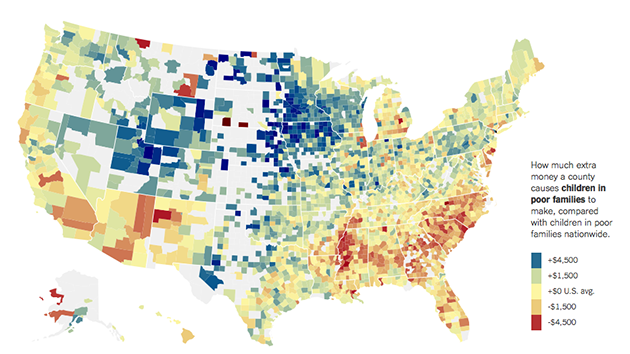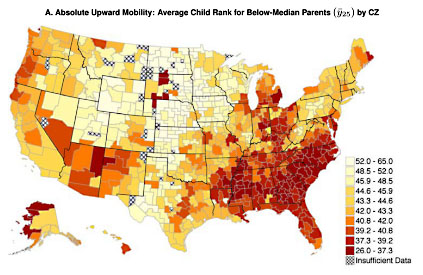
Turns out where you live as a child has a lot to do with how much you'll earn as an adult.<a href="http://www.nytimes.com/interactive/2015/05/03/upshot/the-best-and-worst-places-to-grow-up-how-your-area-compares.html?_r=0&abt=0002&abg=0">Map courtesy of the New York Times</a>
It’s pretty obvious that where you live as an adult has a major impact on your financial situation. It’s way more expensive to live in San Francisco, for example, than in Iowa. But a recent study suggests that where you grow up has a significant impact on your chances of financial success later in life.
The Equality of Opportunity Project, run by Harvard economists Raj Chetty and Nathaniel Hendren, looked at tax records on 5 million families who moved between counties from 1996 to 2012. Analyzing those records, the researchers were able to measure the relative annual income differentials before and after moving. The researchers found several local factors seem to impact a child’s future earning capabilities: race and income segregation, exacerbated income inequality, quality of schools, crime, and the prevalence of two-parent households.
The full list of counties shows that DuPage County, Illinois, just west of Chicago, could be the best of the country’s top 100 counties in terms of children’s upward mobility. Simply by living there, a child could add about $200 to his or her annual income at age 26, a 15 percent premium over the county average nationwide. The worst county for future mobility, Baltimore City, puts children in a position to make more than 17 percent less than the county average.
To see how your county fares, check out the New York Times‘ interactive presentation of the study’s findings.
Chetty and Hendren write that their study “suggests that policy makers seeking to improve mobility should focus on improving childhood environments (e.g., by improving local schools) and not just on the strength of the local labor market availability of jobs.” In other words, trying to provide more economic opportunity for adults starts with leveling the playing field for kids, regardless of where they grow up.













